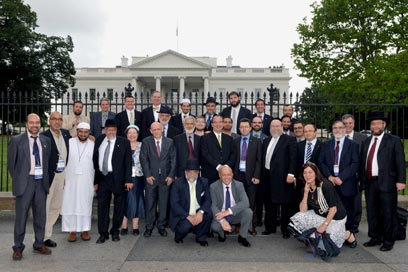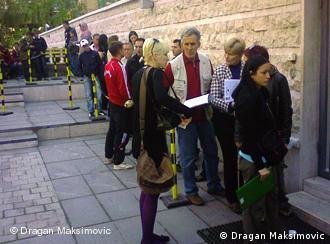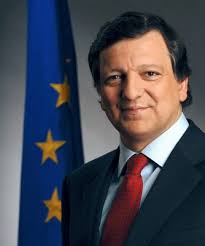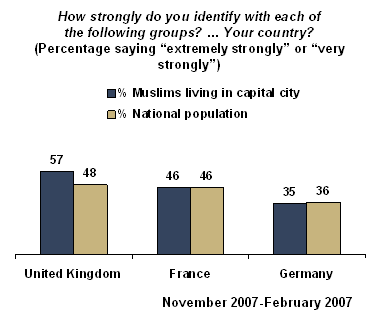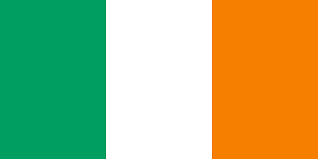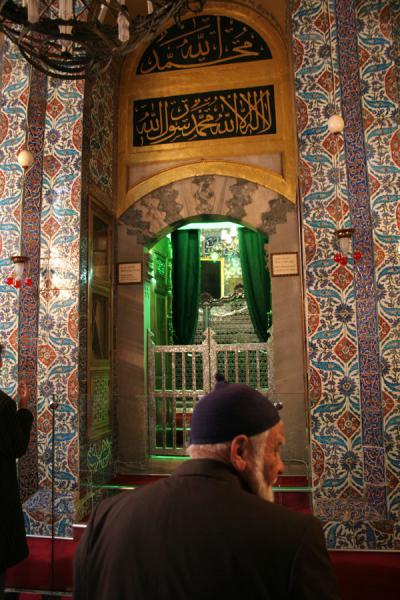
Here are the names of 534 DNA-identified Srebrenica genocide victims scheduled to be laid to rest at the Srebrenica Genocide Memorial on July11, 2009 (Saturday) in Potočari. All victims have their names and a date of birth. May their souls finally rest in peace...
1 Abidović (Ferid) Fikret 1977 1 86 15
2 Abidović (Šaban) Rasim 1940 1 85 17
3 Ademović (Avdo) Sadik 1953 11 22 29
4 Ademović (Mustafa) Esed 1926 1 65 7
5 Ademović (Nurija) Avdo 1926 7 18 42
6 Ademović (Osman) Ibrahim 1937 5 18 24
7 Ahmetović (Abdulah) Merim 1973 12 18 9
8 Ahmetović (Avdulah) Zijad 1974 9 9 8
9 Ahmetović (Edhem) Bećir 1946 7 22 6
10 Ahmetović (Hašim) Ahmo 1936 3 10 7
11 Ahmetović (Osman) Munib 1976 11 4 35
12 Ahmetović (Ramo) Mujo 1927 3 23 22
13 Ahmetović (Ramo) Sulejman 1935 3 24 21
14 Alemić (Salkan) Hajrudin 1956 1 28 5
15 Alić (Abid) Meho 1931 3 33 10
16 Alić (Alija) Hakija 1941 1 12 9
17 Alić (Alija) Mahmut 1959 11 7 32
18 Alić (Hasan) Elvis 1976 10 14 8
19 Alić (Huso) Hasan 1953 10 14 9
20 Alić (Mehmed) Esed 1941 4 2 20
21 Alić (Mevludin) Mirsad 1974 10 18 10
22 Alić (Mujo) Šaćir 1960 1 23 3
23 Alić (Mustafa) Refik 1943 2 10 7
24 Alić (Nurif) Behajija 1952 10 16 12
25 Alić (Nurif) Mesud 1950 10 16 13
26 Alić (Suljo) Mustafa 1949 11 15 27
27 Alić (Šaćir) Mehrudin 1981 1 23 2
28 Alić (Šaćir) Šabo 1925 1 24 4
29 Alić (Zajko) Sado 1970 11 20 21
30 Aliefendić (Džemal) Bahrudin 1976 10 25 16
31 Alihodžić (Smail) Senid 1973 3 32 13
32 Alijašević (Meho) Izet 1940 11 11 37
33 Alispahić (Adil) Behadil 1979 10 22 13
34 Alispahić (Omer) Mujo 1965 3 27 5
35 Atić (Senahid) Sejad 1972 11 17 24
36 Avdić (Ćamil) Zijad 1969 10 21 10
37 Avdić (Daut) Said 1974 1 44 4
38 Avdić (Hamed) Muhamed 1974 6 11 1
39 Avdić (Husejin) Himzo 1941 10 19 1
40 Avdić (Junuz) Hamed 1951 6 10 1
41 Avdić (Junuz) Ramo 1957 6 10 2
42 Avdić (Mehmed) Vahid 1976 7 22 27
43 Avdić (Memiš) Omer 1940 4 12 1
44 Avdić (Mujo) Avdulah 1972 10 24 15
45 Avdić (Selim) Mustafa 1970 4 3 21
46 Bajraktarević (Salko) Alija 1960 10 21 17
47 Bajramović (Atif) Mujo 1969 7 21 32
48 Bašić (Hasan) Hasib 1959 9 6 8
49 Bećirović (Bahrija) Nezir 1948 10 21 12
50 Bećirović (Bajro) Abdulah 1952 7 18 33
51 Bećirović (Bećir) Ibrahim 1951 1 38 6
52 Bećirović (Ibiš) Ahmo 1922 12 17 10
53 Bećirović (Ismet) Sidik 1966 5 38 17
54 Bećirović (Kiram) Seid 1971 1 38 4
55 Beganović (Ahmet) Bajro 1953 12 21 9
56 Begić (Bego) Sabahudin 1972 8 6 17
57 Begić (Emin) Salih 1941 4 17 9
58 Begić (Kadrija) Ejub 1973 8 6 16
59 Begić (Mahmut) Bego 1949 8 6 18
60 Begić (Osman) Mujo 1944 9 14 21
61 Begić (Selman) Hajrudin 1937 4 16 1
62 Begić (Zildžija) Alija 1972 11 19 30
63 Begović (Hašim) Bavludin 1973 10 16 8
64 Begović (Hašim) Kasim 1976 10 16 7
65 Begzadić (Alija) Hajrudin 1954 10 19 10
66 Bekrić (Šaban) Vahid 1974 3 7 7
67 Bektić (Abid) Džemal 1960 11 11 48
68 Bektić (Bekto) Munib 1953 3 4 7
69 Bektić (Džemal) Esad 1958 9 6 6
70 Bektić (Huso) Suad 1967 10 15 10
71 Bektić (Ibrahim) Huso 1938 10 15 11
72 Bektić (Kiram) Kadrija 1974 4 18 4
73 Bektić (Suljo) Bekto 1940 9 5 2
74 Bešić (Mehmedalija) Mevludin 1943 3 28 16
75 Bešlija (Hasan) Hanka 1930 4 18 12
76 Borogovac (Nurdin) Emir 1974 1 81 34
77 Bošnjak (Ohran) Nurija 1968 3 9 11
78 Brgulja (Mehmed) Rešid 1929 4 19 5
79 Budić (Ibro) Ismet 1964 1 84 33
80 Buljubašić (Avdija) Hasan 1938 4 25 21
81 Burić (Meho) Mehmed 1965 4 20 5
82 Čakanović (Ćazim) Hazim 1964 7 17 26
83 Čakanović (Hilmo) Ćazim 1938 7 17 24
84 Čardaković (Hrustem) Behadil 1961 7 31 9
85 Čeliković (Osman) Šaban 1949 5 18 6
86 Ćerimović (Mustafa) Osman 1939 7 20 1
87 Ćerimović (Šaban) Nezir 1936 3 27 17
88 Delić (Alija) Mevludin 1956 9 14 11
89 Delić (Huso) Sejfo 1938 12 15 5
90 Delić (Ibrahim) Ibro 1959 1 15 5
91 Delić (Meho) Sead 1961 10 11 9
92 Delić (Nurko) Senahid 1967 8 10 16
93 Delić (Sado) Haso 1951 11 20 20
94 Delić (Selman) Ramo 1941 1 14 4
95 Delić (Suljo) Mehmed 1950 4 21 21
96 Demirović (Ibro) Ibrahim 1950 10 21 13
97 Dervišević (Huso) Senahid 1965 5 18 16
98 Dervišević (Zaim) Hajrudin 1936 11 22 20
99 Dizdarević (Hakija) Mehmedalija1960 9 7 4
100 Dizdarević (Hedib) Huso 1954 5 30 4
101 Dugonjić (Junuz) Enez 1975 12 15 10
102 Duraković (Bego) Ismet 1944 12 20 12
103 Duraković (Miralem) Mušan 1975 10 12 8
104 Duraković (Miralem) Naser 1971 10 12 7
105 Durić (Hilmo) Mumin 1935 12 20 7
106 Džananović (Šaćir) Nezir 1979 12 24 5
107 Džanić (Bekto) Musred 1955 3 31 15
108 Đogaz (Hamed) Sabahudin 1975 9 4 11
109 Đogaz (Mustafa) Munib 1974 9 3 11
110 Đogaz (Mustafa) Omer 1976 9 3 10
111 Đozić (Alija) Sadik 1955 1 84 7
112 Efendić (Besim) Azem 1938 11 23 16
113 Efendić (Besim) Mehmed 1932 11 23 17
114 Efendić (Husein) Avdo 1967 1 19 3
115 Efendić (Šemso) Ševko 1940 4 22 2
116 Emkić (Ibrahim) Elvedin 1979 10 25 15
117 Fazlić (Omer) Rešid 1931 9 18 1
118 Fejzić (Fadil) Mustafa 1959 12 19 3
119 Fejzić (Nurija) Hasan 1929 2 10 11
120 Fejzić (Šaban) Rijad 1977 11 24 21
121 Gabeljić (Azem) Ćamil 1943 7 22 22
122 Gabeljić (Bajro) Hašim 1950 7 15 29
123 Gabeljić (Hasan) Rasim 1940 5 19 29
124 Gabeljić (Nezir) Alija 1978 9 6 18
125 Gabeljić (Rasim) Mirsad 1966 5 19 28
126 Gabeljić (Sejfo) Omer 1960 3 28 4
127 Garaljević (Enez) Enver 1976 10 20 12
128 Garaljević (Enez) Nevres 1971 10 20 11
129 Garaljević (Ifet) Samir 1974 10 22 12
130 Gerović (Ibro) Hajro 1962 3 7 6
131 Gerović (Nurif) Nurija 1967 4 23 9
132 Gluhić (Mujo) Ibrahim 1932 3 30 13
133 Gobeljić (Bajro) Lutvo 1932 6 2 1
134 Gojčinović (Ahmet) Hamed 1970 4 25 10
135 Gurdić (Mujo) Hazim 1972 6 3 4
136 Gurdić (Mustafa) Junuz 1953 6 12 7
137 Gurdić (Zajim) Elvir 1976 6 14 4
138 Gušić (Sarija) Ibro 1938 5 15 11
139 Hadžibulić (Hašim) Dževad 1974 7 32 6
140 Hadžović (Alija) Azem 1939 10 22 17
141 Hadžović (Nezir) Bahrudin 1977 10 23 16
142 Hadžović (Nezir) Nezmir 1973 10 23 17
143 Hafizović (Mustafa) Ibrahim 1953 7 28 14
144 Hafizović (Mušan) Hasan 1951 12 19 12
145 Hajdarević (Bećir) Šahin 1945 12 18 4
146 Hajdarević (Suljo) Ibrahim 1943 11 16 40
147 Halilović (Adem) Alaga 1931 11 16 26
148 Halilović (Asim) Azmir 1972 4 25 17
149 Halilović (Bajro) Ibro 1972 11 12 49
150 Halilović (Emin) Ramo 1934 4 29 10
151 Halilović (Himzo) Hamed 1969 3 27 26
152 Halilović (Huso) Rifet 1960 10 24 12
153 Halilović (Ibrahim) Muhamed 1972 9 5 7
154 Halilović (Kadrija) Kadmir 1975 1 13 5
155 Halilović (Omer) Memiš 1937 1 83 20
156 Halilović (Ramo) Selim 1953 7 11 15
157 Halilović (Sabrija) Vedhad 1974 9 6 20
158 Halilović (Sado) Salih 1934 5 6 10
159 Halilović (Salih) Bahrudin 1975 5 6 9
160 Hamidović (Selmo) Selim 1956 3 9 7
161 Hamzabegović (Hajrudin) Fehim1970 11 15 40
162 Hamzabegović (Zuhdija) Safet 1968 11 15 36
163 Handžić (Alija) Hirkija 1976 9 8 2
164 Hasanović (Adem) Meho 1937 3 15 28
165 Hasanović (Adil) Nihad 1971 6 8 12
166 Hasanović (Alija) Ahmo 1977 2 10 9
167 Hasanović (Avdo) Ismet 1944 12 17 4
168 Hasanović (Avdo) Nusret 1953 12 16 4
169 Hasanović (Džemal) Fahret 1971 5 40 7
170 Hasanović (Hajro) Salih 1938 3 13 34
171 Hasanović (Hakija) Esad 1970 4 30 2
172 Hasanović (Hasan) Husein 1952 7 27 8
173 Hasanović (Himzo) Nurija 1963 1 82 34
174 Hasanović (Husejin) Senahid 1960 1 80 13
175 Hasanović (Ibrahim) Mehmed 1967 5 40 8
176 Hasanović (Ismet) Ermin 1971 2 8 7
177 Hasanović (Ismet) Jusuf 1976 12 17 5
178 Hasanović (Kadrija) Ismet 1968 9 13 6
179 Hasanović (Mušan) Rifet 1972 8 6 2
180 Hasanović (Ohran) Mevludin 1957 9 14 12
181 Hasanović (Osman) Mustafa 1930 11 20 34
182 Hasanović (Ramo) Kasim 1944 9 13 18
183 Hasanović (Rasim) Džemal 1961 4 32 3
184 Hasanović (Salčin) Osmo 1961 1 80 10
185 Hasanović (Salih) Mujo 1927 12 14 11
186 Hasanović (Sejfo) Hajro 1976 12 18 15
187 Hasanović (Sejfo) Hasib 1975 12 18 16
188 Hasanović (Selim) Bajro 1936 10 26 11
189 Hasanović (Selman) Šaban 1940 11 9 49
190 Hasanović (Šabo) Suljo 1953 3 13 30
191 Hasanović (Zahir) Ibiš 1952 4 33 1
192 Hasanović (Zahir) Ismet 1950 2 9 9
193 Hasić (Ahmo) Sead 1970 2 9 5
194 Hasić (Avdo) Ramo 1949 11 7 35
195 Hasić (Edhem) Munir 1975 12 24 9
196 Hasić (Omer) Jusuf 1950 12 19 13
197 Haskić (Fikret) Ahmo 1975 7 22 40
198 Hirkić (Adem) Suljo 1965 10 22 18
199 Hirkić (Husein) Sabahudin 1975 10 18 11
200 Hirkić (Suljo) Halid 1938 5 11 19
201 Hodžić (Arif) Zulfo 1939 5 15 20
202 Hodžić (Ibro) Mešan 1950 3 26 1
203 Hodžić (Juso) Huso 1965 7 14 33
204 Hodžić (Mujo) Hasan 1957 11 20 33
205 Hodžić (Munib) Sabahudin 1965 1 55 8
206 Hodžić (Salko) Husejin 1933 10 30 11
207 Hodžić (Salko) Sejfo 1958 2 12 13
208 Hodžić (Sejfo) Salko 1928 2 12 15
209 Hrnjić (Salko) Mehmed 1928 5 28 3
210 Hrustanović (Dahmo) Omer 1976 5 27 26
211 Hrustić (Omer) Pašan 1939 7 31 5
212 Hukić (Gajibija) Edhem 1976 5 25 2
213 Hurem (Mustafa) Hajra 1929. 7 25 39
214 Huremović (Hasan) Mirsad 1975 1 79 23
215 Huremović (Hasan) Mustafa 1977 1 79 24
216 Huremović (Mustafa) Ševko 1956 3 29 2
217 Husejinović (Fehim) Ramiz 1977 7 33 2
218 Husejnović (Atif) Feho 1948 3 12 12
219 Husejnović (Hasan) Haso 1960 1 47 7
220 Husejnović (Hašim) Azim 1966 10 29 11
221 Husejnović (Ibro) Dževad 1975 11 15 28
222 Husejnović (Nezir) Aziz 1961 9 15 9
223 Husejnović (Nezir) Mirsad 1968 9 15 10
224 Husejnović (Osman) Nedžad 1973 5 38 7
225 Husejnović (Šaban) Sabit 1954 5 35 7
226 Husić (Hasan) Safet 1969 6 8 10
227 Husić (Husein) Ramo 1953 8 26 6
228 Husić (Mehmed) Mujo 1971 7 26 39
229 Husić (Sado) Behadil 1941 7 21 10
230 Husić (Šaban) Dahmo 1962 12 23 12
231 Husić (Šaćir) Ševal 1968 11 12 38
232 Husić (Vejiz) Seid 1954 5 17 8
233 Ibišević (Omo) Ševko 1945 7 23 4
234 Ibišević (Salko) Rifet 1960 3 20 4
235 Ibrahimović (Atif) Ramo 1927 11 18 26
236 Ibrahimović (Avdo) Salčin 1929 12 25 5
237 Ibrahimović (Bećir) Ramo 1942 11 9 35
238 Ibrahimović (Džemal) Senad 1979 8 4 10
239 Ibrahimović (Omer) Džemail 1964 8 5 16
240 Ibrahimović (Suljo) Muhamed 1937 9 17 8
241 Ibrahimović (Vehbija) Hajdin 1962 11 18 25
242 Ibrić (Mujo) Alija 1947 12 20 6
243 Ibrić (Safet) Almir 1975 9 7 6
244 Imamović (Salih) Safet 1956 5 32 34
245 Imer (Mustafa) Faruk 1950 9 16 6
246 Imširović (Arif) Munib 1970 8 26 10
247 Izmirlić (Ibro) Ismet 1938 12 20 2
248 Jahić (Huso) Mehmed 1935 3 19 26
249 Jahić (Mehmed) Saib 1960 12 22 9
250 Jahić (Osman) Fehim 1958 9 2 7
251 Jakubović (Mujčin) Zikret 1977 5 12 12
252 Jakubović (Mujo) Fikret 1968 5 12 10
253 Jašarević (Huso) Salih 1938 10 15 6
254 Jašarević (Osman) Bajro 1942 5 38 4
255 Jašarević (Salih) Hazim 1969 10 15 5
256 Jugović (Dervo ) Hamed 1942 11 08 48
257 Jugović (Edhem) Sadudin 1969 11 7 46
258 Junuzović (Huso) Šaban 1948 7 24 33
259 Jusupović (Rešid) Teufik 1971 10 20 17
260 Kabilović (Salih) Hamed 1958 5 31 35
261 Kabilović (Zajim) Rešid 1959 1 78 5
262 Kadrić (Hasan) Hamed 1973 11 14 45
263 Kadrić (Ibro )Memiš 1942 12 15 6
264 Kandžetović (Bekto) Behaija 1961 3 6 13
265 Kandžetović (Bekto) Džemal 1971 3 6 12
266 Kapetanović (Meho ) Jusuf 1932 10 19 11
267 Kardašević (Husein) Azmir 1978 8 15 2
268 Karić (Džemal) Edin 1968 12 19 8
269 Karić (Ramo) Džemal 1938 12 19 7
270 Klančević (Halid) Sead 1964 7 10 18
271 Klempić (Sinan) Mulo 1939 2 11 17
272 Klinčević (Omer) Adem 1933 11 12 52
273 Kolarević (Mehmed) Hasib 1939 11 15 28
274 Kovačević (Meho) Osman 1929 3 19 8
275 Kozić (Hasan) Amir 1938 11 8 34
276 Krdžić (Abid) Bajro 1936 3 14 32
277 Krdžić (Aljo) Seid 1961 3 25 7
278 Kremić (Asim) Alaga 1963 1 17 3
279 Kumrić (Mujo) Ibrahim 1931 7 12 27
280 Kurtić (Hakija) Vahid 1954 12 18 14
281 Lemeš (Aljo) Ahmo 1945 10 18 15
282 Lemeš (Bekto) Munib 1953 10 19 15
283 Majstorović (Hasan) Huso 1968 5 17 20
284 Malagić (Hadžo) Ariz 1971 11 15 42
285 Malagić (Ohran) Izudin 1981 11 13 37
286 Malagić (Šaban) Vahidin 1968 3 20 36
287 Malić (Bajro) Hakija 1952 3 21 13
288 Malić (Mujo) Omer 1953 10 17 15
289 Malić (Omer) Enver 1977 10 17 14
290 Malkić (Behajija) Mevludin 1964 3 19 18
291 Mandžić (Juso) Ramo 1941 9 16 2
292 Mandžić (Ramo) Samir 1979 9 16 1
293 Mašić (Osmo) Džemal 1943 1 71 10
294 Mašić (Osmo) Hakija 1936 1 70 10
295 Mehanović (Atif) Smail 1968 12 14 1
296 Mehanović (Šaćir) Rifet 1956 9 16 17
297 Mehić (Hasan) Lutvo 1978 11 14 30
298 Mehić (Husein) Azim 1976 5 33 13
299 Mehić (Ramiz) Rahim 1974 11 14 31
300 Mehmedović (Abdurahman) Sead1954 4 06 6
301 Mehmedović (Adem) Adil 1962 3 23 18
302 Mehmedović (Ahmo) Muhamed 1975 3 22 27
303 Mehmedović (Alija) Rahman 1938 3 24 17
304 Mehmedović (Bećir) Abid 1953 11 9 43
305 Mehmedović (Bećir) Ramiz 1960 11 9 42
306 Mehmedović (Hasan) Omer 1978 7 21 1
307 Mehmedović (Haso) Hariz 1961 11 18 22
308 Mehmedović (Hašim) Dževad 1961 7 25 18
309 Mehmedović (Ibrahim) Lutvo 1966 11 10 36
310 Mehmedović (Mehmed) Salko 1929 10 24 16
311 Mehmedović (Meho) Hakija 1949 1 78 16
312 Mehmedović (Osman) Bešir 1947 1 71 2
313 Mehmedović (Osman) Husejin 1965 5 21 30
314 Mehmedović (Osman) Reuf 1969 5 21 26
315 Mehmedović (Osman) Šaban 1954 11 21 27
316 Mehmedović (Salih) Mušan 1941 8 25 6
317 Mehmedović (Senahid) Senad1978 5 16 11
318 Mekanić ef. (Mustafa) Junuz 1947 12 24 4
319 Memić (Alaga) Uzeir 1938 11 19 21
320 Memić (Huso) Rašid 1952 12 21 10
321 Merajić (Ibrahim) Sabrija 1943 5 25 20
322 Merajić (Ramo) Mulo 1969 3 31 11
323 Mešanović (Avdo) Salih 1920 7 17 22
324 Mešanović (Salih) Hajro 1964 3 24 11
325 Muharemović (Abdulah) Šahbaz1975 12 23 7
326 Muharemović (Hakija) Džemaludin1952 12 16 9
327 Muharemović (Rahman) Ibrahim1941 12 18 8
328 Muhić (Hašim) Šukrija 1936 6 10 5
329 Mujanović (Mujo) Muradif 1957 11 13 34
330 Mujčinović (Mujo) Avdulah 1964 10 20 16
331 Mujić (Alija) Abdulah 1970 11 21 19
332 Mujić (Alija) Halil 1978 12 15 11
333 Mujić (Alija) Hamdija 1973 11 21 20
334 Mujić (Alija) Salčin 1938 12 22 4
335 Mujić (Himzo) Izet 1964 3 14 10
336 Mujić (Kasim) Bego 1936 7 11 30
337 Mujić (Mehmed) Hasan 1961 7 14 36
338 Mujić (Mehmed) Jakub 1968 7 14 34
339 Mujić (Mujo) Bajro 1933 3 25 42
340 Mujić (Mustafa) Mujo 1946 11 12 37
341 Mujić (Ohran) Ibrahim 1955 3 5 9
342 Mujić (Ohran) Osman 1962 3 5 10
343 Mujić (Suljo) Junuz 1955 3 26 12
344 Mujić (Šaban) Redžep 1971 6 11 8
345 Mujić (Ševko) Hajrudin 1960 7 17 33
346 Mujkić (Ramo) Husein 1975 11 6 31
347 Mujkić (Ramo) Veid 1971 11 6 30
348 Mujkić (Redžo) Šaban 1955 11 13 48
349 Mulalić (Hajro) Senad 1966 7 10 17
350 Mulalić (Salih) Hajro 1941 7 10 16
351 Muminović (Adem) Ismet 1948 10 18 16
352 Muminović (Aljo) Mehmedalija 1954 3 25 29
353 Muminović (Fehim) Saudin 1981 1 70 9
354 Muminović (Fehim) Suljo 1979 1 70 8
355 Muminović (Idriz) Hasan 1950 12 17 15
356 Muminović (Mehmedalija) Mensur1977 3 24 29
357 Muminović (Munib) Nedžad 1974 11 10 50
358 Muminović (Šahin) Hamid 1963 3 24 7
359 Murathodžić (Nedžib) Munezir 1940 10 24 8
360 Muratović (Alija) Halil 1937 8 21 3
361 Muratović (Meša) Safet 1958 9 9 5
362 Muratović (Nurif) Ibrahim 1945 1 79 10
363 Mustafić (Adem) Amir 1979 4 19 2
364 Mustafić (Bekir) Jusuf 1956 1 78 8
365 Mustafić (Izet) Nevzet 1974 7 13 4
366 Mustafić (Nurija) Salko 1952 5 20 9
367 Mustafić (Omer) Mensur 1939 7 15 5
368 Mustafić (Osman) Nurija 1961 2 11 2
369 Mustafić (Rešid) Esed 1968 12 17 14
370 Mustafić (Safet) Sejdalija 1946 3 26 31
371 Mustafić (Salkan) Šaban 1942 11 8 45
372 Mustafić (Suljo) Edhem 1940 12 22 3
373 Muškić (Hašim) Šabo 1950 11 13 33
374 Nekić (Daut) Ejub 1954 7 27 38
375 Nuhanović (Abdurahman) Rasim 1966 9 12 6
376 Nuhanović (Abdurahman) Senahid1974 9 12 7
377 Nukić (Alija) Halil 1937 12 23 6
378 Nukić (Asim) Šemsudin 1965 11 11 51
379 Nukić (Hasan) Husejin 1946 12 23 11
380 Nukić (Ikan) Munib 1944 10 23 11
381 Nukić (Ikan) Ramo 1931 10 23 12
382 Nukić (Munib) Šefik 1968 2 7 3
383 Nukić (Rasim) Nermin 1978 1 80 12
384 Nukić (Šaban) Osman 1936 11 11 36
385 Numanović (Rašid) Nedžad 1972 5 27 12
386 Omerović (Abid) Adib 1977 12 16 15
387 Omerović (Alija) Hamdija 1971 10 17 10
388 Omerović (Feho) Fehim 1942 9 2 2
389 Omerović (Ibro) Husein 1978 11 17 34
390 Omerović (Mulo) Osmo 1970 3 20 16
391 Omerović (Mustafa) Said 1970 9 1 4
392 Omerović (Osman) Mahmut 1953 3 20 12
393 Omerović (Ramo) Ćamil 1974 11 23 22
394 Omerović (Selim) Abid 1952 12 16 14
395 Omerović (Suljo) Šaban 1947 7 30 7
396 Ordagić (Ibro) Nermin 1978 10 21 18
397 Orić (Behaija) Vejsil 1978 1 16 4
398 Orić (Šahin) Elvir 1976 12 14 5
399 Osmanović (Abdulah) Sulejman1980 5 40 04
400 Osmanović (Edhem) Edmir 1977 12 21 4
401 Osmanović (Edhem) Elvir 1977 12 21 5
402 Osmanović (Edhem) Ferida 1963. 12 13 2
403 Osmanović (Edhem) Hamdija 1947 3 31 23
404 Osmanović (Habib) Nermin 1971 9 5 14
405 Osmanović (Hasan) Šećo 1933 9 10 11
406 Osmanović (Junuz) Meho 1960 2 8 5
407 Osmanović (Mehmed) Hamed1941 10 18 1
408 Osmanović (Mehmed) Omer 1968 3 33 20
409 Osmanović (Mehmed) Salčin 1974 3 33 21
410 Osmanović (Munib) Ahmedin 1980 5 18 28
411 Osmanović (Mustafa) Elvir 1976 11 8 33
412 Osmanović (Omer) Ramo 1953 5 24 4
413 Osmanović (Osman) Muhibija1935 5 24 1
414 Osmanović (Osman) Safet 1920 3 33 2
415 Osmanović (Ramo) Nermin 1976 5 24 3
416 Osmanović (Safet) Mehmedalija1950 3 31 1
417 Osmanović (Salko) Rahman 1957 5 22 22
418 Osmanović (Sinan) Mehmedalija1953 1 29 1
419 Osmić (Bajro) Zehrudin 1971 11 18 23
420 Palalić (Ibrahim) Jusuf 1946 6 11 5
421 Pašalić (Hadžo) Muharem 1935 6 12 4
422 Pehratović (Bego) Suljo 1934 12 26 1
423 Pehratović (Ibrahim) Bajro 1947 1 54 3
424 Pehratović (Ramo) Juso 1936 1 54 1
425 Pehratović (Suljo) Lutvo 1963 12 26 2
426 Pirgić (Suljo) Smail 1978 11 15 31
427 Purković (Salkan) Nutfet 1949 7 20 40
428 Rahmić (Bekto) Dahmo 1955 7 26 45
429 Rahmić (Fahro) Mirsad 1973 3 32 27
430 Rahmić (Šaban) Islam 1960 5 29 37
431 Ramić (Redžep) Ibrahim 1971 11 19 22
432 Redžić (Imšir) Ramo 1930 12 14 10
433 Rizvanović (Ibrahim) Alija 1944 7 10 24
434 Salčinović (Abdurahman) Murat1959 5 23 23
435 Salić (Esed) Fahrudin 1975 9 11 33
436 Salihović (Avdo) Rifet 1953 7 17 20
437 Salihović (Ibro) Meho 1942 1 63 2
438 Salihović (Ibro) Safet 1945 11 17 27
439 Salihović (Lutvo) Mesud 1929 4 34 2
440 Salihović (Mehmed) Mustafa 1964 5 25 22
441 Salihović (Mujo) Hajrudin 1978 1 50 3
442 Salihović (Mujo) Ramiz 1954 11 16 25
443 Salihović (Murat) Safet 1942 1 77 7
444 Salihović (Ramo) Redžep 1953 5 27 32
445 Salihović (Rifet) Kiram 1972 7 7 21
446 Salihović (Safet) Ibrahim 1968 11 17 25
447 Salihović (Suljo) Senahid 1964 5 26 21
448 Salihović (Šahin) Ibrahim 1946 11 3 27
449 Salihović (Šemso) Mevludin 1953 10 19 16
450 Salkanović (Mustafa) Ibrahim 1936 3 17 8
451 Salkić (Abdulah) Elvis 1977 5 30 28
452 Salkić (Džano) Muhamed 1978 1 22 4
453 Salkić (Ramo) Samir 1972 12 16 10
454 Salkić (Zajko) Zulfo 1966 11 9 38
455 Sejdinović (Ahmo) Mehmedalija1958 5 28 19
456 Sejdinović (Jusuf) Munib 1963 12 18 3
457 Sejdinović (Mehmedalija) Bego1980 5 27 20
458 Sejdinović (Nezir) Mirsad 1973 12 19 2
459 Sejmenović (Alija) Senahid 1976 8 13 5
460 Selimović (Ahmet) Abdulah 1973 1 50 2
461 Selimović (Atif) Ševko 1946 7 11 10
462 Selimović (Hakija) Kadir 1956 2 28 23
463 Selimović (Hasib) Mevludin 1961 9 13 8
464 Selimović (Idriz) Aziz 1963 12 16 6
465 Selimović (Idriz) Munib 1965 12 16 5
466 Selimović (Idriz) Omer 1952 3 34 10
467 Selimović (Mehmed) Alija 1944 10 30 7
468 Selimović (Osman) Durmo 1934 12 22 8
469 Selimović (Osman) Selim 1938 12 20 11
470 Selimović (Ševko) Sabit 1974 7 11 13
471 Selimović (Ševko) Selim 1975 5 22 28
472 Selimović (Uzeir) Asim 1964 1 81 12
473 Sinanović (Dedo) Šaban 1946 7 22 45
474 Sinanović (Jusuf) Salih 1975 1 71 5
475 Sinanović (Ramo) Nurif 1919 5 28 27
476 Sinanović (Ramo) Safet 1927 5 29 27
477 Siručić (Nurija) Abid 1941 7 10 12
478 Siručić (Nurija) Mujo 1943 7 10 11
479 Smajić (Adem) Sejfo 1973 1 33 7
480 Smajić (Bilal) Murat 1973 11 7 31
481 Smajić (Emin) Bajro 1950 5 31 19
482 Smajić (Hamid) Azmir 1977 9 12 24
483 Smajić (Hasan) Haso 1941 9 10 16
484 Smajić (Omer) Jusuf 1938 9 12 23
485 Smajić (Salih) Sejdulah 1949 11 10 39
486 Smajić (Salko) Alija 1943 9 8 18
487 Smajilović (Šaban) Šahman 1932 4 4 12
488 Smajlagić (Bekir) Salih 1968 9 10 6
489 Smajlagić (Salih) Bekir 1936 9 10 7
490 Smajlović (Ahmet) Ševko 1939 7 18 13
491 Smajlović (Edhem) Nedžib 1947 12 18 13
492 Smajlović (Habib) Sabit 1953 12 23 2
493 Smajlović (Mešan) Hašim 1922 11 5 29
494 Smajlović (Ramiz) Samir 1977 11 12 46
495 Smajlović (Rašid) Rešad 1975 8 22 4
496 Smajlović (Šahman) Izet 1956 4 4 13
497 Smajlović (Ševko) Mesud 1962 9 3 15
498 Softić (Mehemed) Mujo 1929 3 29 14
499 Subašić (Fehim) Nermin 1977 11 22 19
500 Subašić (Ibrišim) Ago 1932 11 10 35
501 Sulejmanović (Alaga) Nusret 1959 12 24 10
502 Sulejmanović (Husein) Sejdalija1957 12 25 6
503 Suljaković (Šemso) Izet 1962 4 11 7
504 Suljić (Alija) Kemo 1977 7 20 30
505 Suljić (Bekir) Mujo 1978 5 32 32
506 Suljić (Hamdija) Muharem 1977 11 22 26
507 Suljić (Hamdija) Sulejman 1970 11 22 27
508 Suljić (Husejin) Kemal 1954 7 19 28
509 Suljić (Juso) Omer 1931 7 17 40
510 Suljić (Šaban) Alija 1940 7 10 27
511 Šahinović (Šaban) Adem 1970 12 17 9
512 Šaranović (Šaćir) Ševkija 1943 12 14 6
513 Šečić (Meho) Ismet 1938 10 26 7
514 Šehić (Ejub) Ramiz 1969 10 29 14
515 Šehomerović (Ohran) Omer 1946 11 24 17
516 Šeta (Zulfo) Nesib 1940 2 9 7
517 Špijodić (Himzo) Bego 1967 5 30 8
518 Špiodić (Idriz) Refik 1960 9 14 6
519 Tabaković (Abdulah) Sadik 1975 1 85 25
520 Tabaković (Osman) Ahmo 1939 1 85 7
521 Tabaković (Ramiz) Hazim 1979 5 35 21
522 Tabaković (Suljo) Muhamed 1955 9 16 8
523 Tepić (Abdulah) Faruk 1975 7 19 43
524 Tepić (Mujo) Jusuf 1938 7 19 40
525 Topalić (Ramiz) Asim 1959 10 23 1
526 Tursunović (Mujo) Daut 1945 8 7 12
527 Vejzović (Selim) Bajro 1940 7 31 8
528 Vejzović (Zejnil) Safet 1967 5 36 18
529 Vranjkovina (Ragib) Emin 1938 11 9 34
530 Vranjkovina (Ramiz) Đerziz 1976 7 26 30
531 Zejnilović (Zuhdija) Hidajet 1946 11 13 41
532 Zuhrić (Mehmed) Esad 1973 5 34 18
533 Zukanović (Suljo) Selim 1935 1 74 5
534 Ždero (Hamed) Rašid 1964 9 8 28
Source:
Srebrenica Genocide Blog
